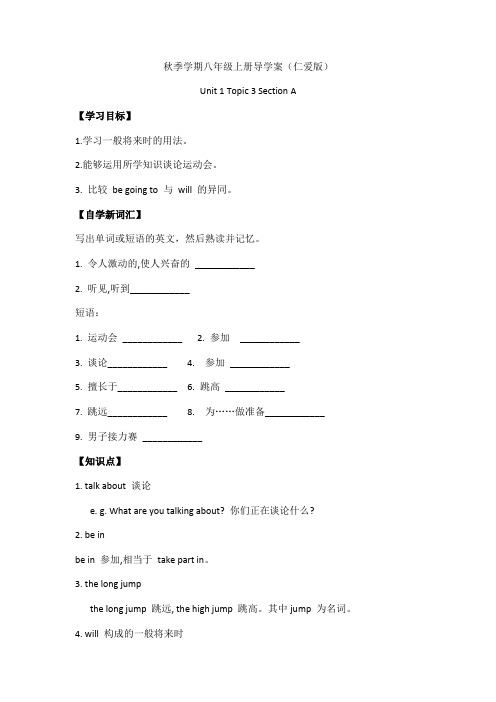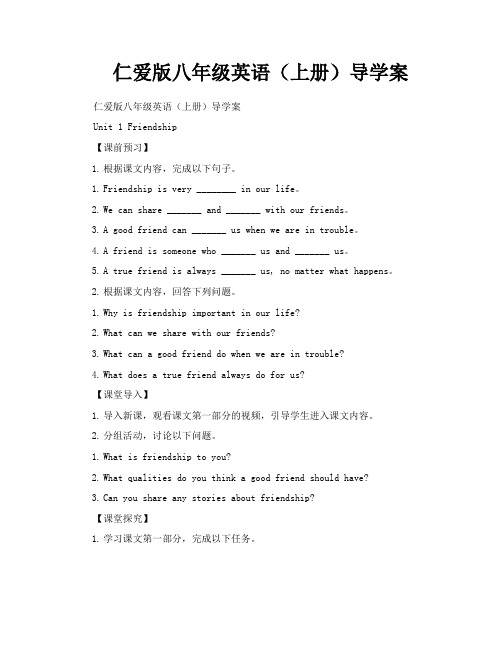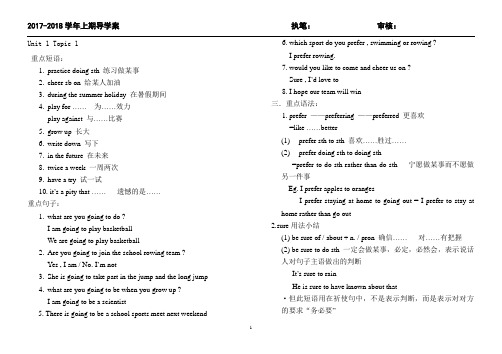仁爱版八年级英语上册导学案(全册)
Unit+1+Topic+3+Section+A+导学案 仁爱版八年级英语上册

秋季学期八年级上册导学案(仁爱版)Unit 1 Topic 3 Section A【学习目标】1.学习一般将来时的用法。
2.能够运用所学知识谈论运动会。
3. 比较be going to 与will 的异同。
【自学新词汇】写出单词或短语的英文,然后熟读并记忆。
1. 令人激动的,使人兴奋的____________2. 听见,听到____________短语:1. 运动会____________2. 参加____________3. 谈论____________4. 参加____________5. 擅长于____________6. 跳高____________7. 跳远____________ 8. 为……做准备____________9. 男子接力赛____________【知识点】1. talk about 谈论e. g. What are you talking about? 你们正在谈论什么?2. be inbe in 参加,相当于take part in。
3. the long jumpthe long jump 跳远, the high jump 跳高。
其中jump 为名词。
4. will 构成的一般将来时will 为一般将来时的助动词,一般将来时的结构为:will +动词原形。
5. Shall I+动词原形?(1) shall 表示“将要,将会”。
(2) shall 只能与第一人称I 和we连用。
shall 为一般将来时的助动词。
e. g. I shall go skating this weekend. 这个周末我要去滑冰。
(3) shall 还可用于疑问句中,表示征询对方意见。
e. g. Shall we have a rest? = Why not have a rest? 我们休息一会儿好吗?6. will构成一般将来时的句型(1)肯定句:主语+ will + 动词原形+其他。
仁爱版初中英语八年级上册导学案【全册】

Unit 1 Playing SportsTopic 1 Are you going to play basketball?Section A第一部分词汇导学1. almost adv./adj. 几乎、差不多。
表示虽不完全是,但是几乎可以算是。
e.g. He watches TV almost every night. (adj.)He almost works out the problem. (adv.)2. against pre. (介)对着、反对。
带有反对、敌对的含义,常用的动词短语有:play against…和…比赛,fight against…和…打架/斗争,be against....反对/违背…e.g. Everyone should fight against evil(罪恶).We will play basketball against Class 3 next week.3. cheer v.为…加油、欢呼,常用短语: cheer sb. one.g. We will cheer you on at the sports meeting.4. prefer v. 更喜欢,更愿意,宁愿。
常用短语和句型有:①prefer sth. /doing sth. 更喜欢…/做…I prefer ball games/playing ball games.②prefer sth./doing sth. to sth. /doing sth. (这里的to 是介词)I prefer dumplings to noodles.I prefer swimming to running.【同义】like … better(than…)I like swimming better than running.5. bit n.一点,一些,少量。
常用短语:①a bit of , 相当于a few/ a little , 修饰名词,也常用a little bit of…e.g.: I can speak a little bit of English.②a bit 副词,可以用来修饰形容词/副词。
仁爱版八年级英语(上册)导学案

仁爱版八年级英语(上册)导学案仁爱版八年级英语(上册)导学案Unit 1 Friendship【课前预习】1.根据课文内容,完成以下句子。
1.Friendship is very ________ in our life。
2.We can share _______ and _______ with our friends。
3.A good friend can _______ us when we are in trouble。
4.A friend is someone who _______ us and _______ us。
5.A true friend is always _______ us, no matter what happens。
2.根据课文内容,回答下列问题。
1.Why is friendship important in our life?2.What can we share with our friends?3.What can a good friend do when we are in trouble?4.What does a true friend always do for us?【课堂导入】1.导入新课,观看课文第一部分的视频,引导学生进入课文内容。
2.分组活动,讨论以下问题。
1.What is friendship to you?2.What qualities do you think a good friend should have?3.Can you share any stories about friendship?【课堂探究】1.学习课文第一部分,完成以下任务。
1.阅读课文第一部分,并完成下面的练习。
a) 用自己的话总结出这部分的主要内容。
b) 在文中找出表示原因的句子,并写出原因。
c) 找出文中的两个意思相同的词组。
2.配对合作,完成课本练习。
2017-2018学年上期八年级仁爱英语导学案(全一册)

Unit 1 Topic 1重点短语:1.practice doing sth 练习做某事2.cheer sb on 给某人加油3.during the summer holiday 在暑假期间4.play for ……为……效力play against 与……比赛5.grow up 长大6.write down 写下7.in the future 在未来8.twice a week 一周两次9.have a try 试一试10. it‘s a pity that ……遗憾的是……重点句子:1.what are you going to do ?I am going to play basketballWe are going to play basketball2.Are you going to join the school rowing team ?Yes , I am / No. I‘m not3.She is going to take part in the jump and the long jump4.what are you going to be when you grow up ?I am going to be a scientist5. There is going to be a school sports meet next weekend6. which sport do you prefer , swimming or rowing ?I prefer rowing.7. would you like to come and cheer us on ?Sure , I‘d love to8. I hope our team will win三.重点语法:1. prefer ——preferring ——preferred 更喜欢=like ……better(1)prefer sth to sth 喜欢……胜过……(2)prefer doing sth to doing sth=prefer to do sth rather than do sth 宁愿做某事而不愿做另一件事Eg. I prefer apples to orangesI prefer staying at home to going out = I prefer to stay athome rather than go out2.sure用法小结(1) be sure of / about + n. / pron 确信……对……有把握(2) be sure to do sth 一定会做某事,必定,必然会,表示说话人对句子主语做出的判断It‘s sure to rainHe is sure to have known about that·但此短语用在祈使句中,不是表示判断,而是表示对对方的要求“务必要‖Be sure not to forget it(3)be sure + 宾语从句―确信某事一定会……‖we are sure he will make great progress this termMay sure of his coming before you set off 出发之前要确定他是否来1.掌握be going to + 动词原形和will / shall + 动词原形表将来Topic 2一.重点短语1.join sb 加入某人的行列2.fall ill 生病3.keep doing sth 一直做某事4.give sb a hand 帮某人的忙5.throw …… around / about 乱扔6.shout at ……朝……大嚷7.be angry with sb 生某人的气8.be sorry for / about ……对……感到抱歉/难过9.at first = in the beginning 起初e into being 形成11.stop / keep / prevent sb from doing sth 阻止某人做某事12.a pair of running shoes 一双跑鞋13.go for a picnic 去野餐二.重点句子:1. will you join us ? Yes ,I‘d be going to2.will you take part in it ? of course , I will3. would you mind / Do you mind teaching me ?Would you mind / Do you mind if I try it again ?Would you mind / Do you mind me / my opening the door ? Would you mind / Do you mind me not throwing bottles around ? 委婉请求的句子及回答肯定:(不介意)Not at all / certainly not / of course not否定:(介意)You ‗d better not . / I‘m sorry .I won‘t do it again .2.I‘m sorry for what I said . It‘s nothing / Never mind3.Is Michael in ? This is Michael speaking (电话用语) 三.重点语法:1. mind 用法小结mind n. “想法,意见”/动词为“介意”,常用于否定句和疑问句中make up on e‘s mind to do sthchange on e‘s mindkeep sth in mindmind sth / doing sthI don‘t mind the smellTopic 31.run after 追赶2.every four years 每隔四年3.in turn 轮流4.at least 至少5.be good at = do well in 擅长……(反义) do badly in ……6.break the world record 打破世界纪录7.be regarded as ……被看作……8.a symbol of / stand for ….. ….的象征代表……9.be in / join in / take part in……参加……10.be good for …对….有好处be bad for ….对….有坏处一.重点句子:1.Which sport will you take part in ? I‘ll be in the long jump2.Should I take my camera ? Ok / Good idea / Yes ,youcan / No you mustn‘t3.When shall we meet ? Let‘s make it half past six4.Where shall we meet ? At my house5.I believe you will win I hope so二.重点语法:1.see , hear , notice , find , feel , listen to , look at sb do sth look at sb doing sthdo 强调动作的全过程,经常性和习惯性doing强调动作正在进行I often hear Lily sing English songs in her room .2. leave 名词意为“假期,休假”动词意为“离开,留下”“把……忘在某地”Eg. He is badly ill ,so he has to ask for a two-month leave When are they leaving ?They are leaving Beijing for Shanghai tomorrowMike is such a careless boy that he often leaves his homework at home2.辨析spend / take / cost / pay 四个花费主语为人sb spend 金钱on sthsb spend 时间(in) doing sthsb pay 金钱for sth主语为物sth cost sb sm. 某物花费某人多少钱主语为it. It takes/took sb st to do sth 做某事花费某人多长时间Unit 2 Keeping healthyTopic 1一.词组与语法1.have + a + 身体部位(单数)/ 名词单数eg. have a cold . a head ache . a fever 得感冒,头疼,发烧have + sore + 身体部位(复数/单数)eg: have sore eyes 眼酸have a sore throat 嗓子疼2. had better (not) do sth 最好做(不做)某事3. see a dentist 看牙医4. get well 恢复健康5. too much ―太多……‖ +un (不可数n. ) , 或放句尾修饰动词too many ―太多……‖ + cn (不可数n. )『too many apples』much too ―太……‖ + adj. / adv. 『much too big /quickly』eg.: too much water / You watch TV too much6.lie 说谎vi/n. lie——lied——lied——lyinglie 躺,位于vi. lie——lay——lain——lyinglay 放置,下蛋vi lay——laid——laid——laying7. enough + n. adj / adv. + enough .8. feel like doing sth 想要做某事9. plenty of = lots of = a lot of + cn.pl = manyplenty of = lots of = a lot of + un. = much10. ask for one week‘s (名词所有格) leave 请一周的假ask for help 求助ask sb to do sth 要求某人做某事ask sb for sth 向某人要某物11.return to sp. = go / come back to sp. 返回某地。
仁爱英语八年级上册学案(完整版)

仁爱英语八年级上册学案Unit 1 Playing SportsTopic 1 Are you going to play basketball?学案一、预习目标【课标单词】almost (adv.)几乎,差不多against(prep.)对着,反对term(n.)学期;术语;条款;项cheer(v.)加油,欢呼;喝彩(n.)欢呼声team(n.)队,组win(v.)获胜,赢得sport(n.)体育活动,锻炼prefer(v.)更喜欢,宁愿(选择)cycle(v.)骑自行车row(v.)划船(n.)(一)排,(一)行quite(adv.)相当,很,十分bit(n.) 一点,一些,少量join(v.)加入,参加;连接;会合club(n.)俱乐部;纸牌中的梅花skate(v.)溜冰,滑冰ski(v.)滑雪(n.) 滑雪;滑雪板volleyball(n.)排球tennis(n.)网球player(n.)比赛者。
选手dream(n.)梦,梦想(v.)做梦grow(v.)成长,生长;发育;种植;变成dancer(n.)跳舞者,舞蹈演员future(n.)将来job(n.)(一份)工作famous(adj.)著名的arrive(v.)到达,达到excited(adj.)激动的,兴奋的leave(v.)离开;把…留下,剩下(n.)假期gold(n.)黄金(adj.)金黄色的,金的medal(n.)奖牌,勋章Olympic(adj.)奥林匹克运动会的cup(n.)奖杯;杯子;酒杯World Cup世界杯shame(n.)遗憾的事;羞愧active(adj.)精力旺盛的;积极的,主动地runner(n.)赛跑者;操作者;滑行装置break(v.)打破(断,碎);撕开(n.)课间休息record(n.)记录;唱片△hike(v.)去…远足;做徒步旅行spend(过去式spent)(v.)度过;花费(金钱,时间等)hour(n.)小时exercise(n.)锻炼,做操;练习(v.)锻炼baseball(n.)棒球pretty(adv.)颇,相当;十分,非常(adj.) 漂亮的,俊俏的jump(v.)跳跃(n.)跳跃;猛扑weekend(n.)周末p.m. 下午,午后a.m.上午,午前popular(adj.)流行的,大众的,受欢迎的heart(n.)心脏,心;纸牌中的红桃lung(n.)肺;肺脏healthy(adj.)健康的,健壮的fit(adj.)健康的;(v.)(使)适合;安装1relax(v.)(使)放松,轻松mountain(n.)山,山脉1. almost(反义词)never2.win(过去式)won(名词)winner3.ski(现在分词)skiing4.famous(比较级)more famous5.arrive(同义词)reach6.leave(过去式))left7.popular(最高级)most popular8.healthy(同义词)fit(名词)health【重要短语】1. during the summer holidays 在暑假期间2. between…and… 在两者之间3. cheer sb. on 为某人加油4. prefer doing sth. 更喜欢做某事5. quite a bit/a lot 很多6. plan to do sth. 计划做某事7. have a skating club 举办滑雪俱乐部8. arrive in 到达9. play against… 与……对抗/较量10. for long 很久11. leave for… 动身去…12. the day after tomorrow 后天13. places of interest 名胜14. play baseball 打棒球15. at least 至少16. be good at 善于做某事17. take part in 参加18. all over the world 全世界19. be good for 对……有益20. a good way 一种好方法21. keep fit/healthy 保持健康22. relax oneself 放松某人自己23.goskating/skiing/cycling/climbing/hiking去滑雪/滑冰/骑车/爬山/远足【重要句型】1. What’s your favorite sport? = What sport do you like best? 你最喜爱的运动是什么?2. Which sport do you prefer? = Which sport do you like better? 你更喜欢什么运动?3. I prefer skating. = I like skating better. 我更喜欢滑雪.4. Do you skate much? = Do you often skate? 你常滑雪吗?5. She spends at least half an hour in the gym every day. 每天她至少花半小时在体育馆.6. She plays baseball pretty well and she is also good at jumping.她棒球打得相当好而且擅长于跳.7. What kind of sports do you like? = Which sport do you like? 你喜欢哪种运动?8. Would you like to come and cheer us on ? 你愿意来为我们加油吗?9. What are you going to be when you grow up? 当你长大后做什么?10. There is going to be a school sports meet next month.下月有一场运动会。
仁爱版八年级英语上册导学案(全册)

仁爱版八年级英语导学案Unit1 Playing sportsTopic1 Are you going to play basketball? Section A学习目标:1.掌握Page1—2的单词,重点短语及句型。
2.熟练掌握“be going to +动词原形”的结构表示的一般将来时。
3.积极、主动的参与课堂。
学习重难点:1.一般将来时来时概念:表示将要发生的动作或存在的状态及打算、计划或准备做某事。
基本结构:be going to + do(动词原形);.句中一般有以下时间状语:(后tomorrow, next day(week, month, year…),soon, the day after tomorrow 天)等。
否定句:在be动词(am, is, are)后加not;一般疑问句:be提到句首,some改为any, and改为or,第一二人称互换。
例如:I’m going to have a picnic this afternoon.not going to have a picnic this afternoon.→ I’mWe are going to go on an outing this weekend.→ Are you going to go on an outing this weekend?2. see sb do sth “看见某人做某事” 表示看见事件、行动的全过程,动作已经结束。
看见某人正在做某事”强调事件正在进行。
see sb doing sth “3.have a … game against … “同…进行一场…比赛”4.cheer…on “为某人加油(喝彩)”5.-- Would you like to do sth?-- Sure, I’d love to.6. Me,too.自学引导:1、自学Page1-2的单词。
(根据音标拼读、拼写单词并牢记)。
仁爱八年级上册Unit1-Topic1导学案
Unit 1 Topic 1 I’m going to play basketball. Section A一、自主探究1、have a basketball game against…____________2、cheer us on ______________3、prefer rowing ________________4、quite a bit / a lot____________5、join the school rowing club6、打算做某事______________7、看见某人做某事8、看见..正在做... 9、和……相比更喜欢……10、加入某人行列11、参加篮球比赛二、能力提升1、I’m going to play basketball.翻译: .【分析点拨】⑴“be going to + 动词原形”表示将要发生的事或打算、计划、决定要做某事。它常与tomorrow, next week/month/year, in a few days, from now on 等表示将来时间的状语连用。例如:看,快要下雨了。
Look.!It ________ going to ________.⑵be going to在肯定句中的形式be going to结构中的be它一般有三种形式,当主语是I时用______;当主语是第三人称单数时用______;当主语是其他人称时用______。
例如:她明天去看望王先生. She _____ _____ ___ see Mr. Wang tomorrow.⑶含be going to的句子变否定句和一般疑问句由于句子中有be,即在be 的后面加上_______就构成了否定句;把_______放到句首,在句末加问号就构成了一般疑问句.例如:They are going to see the farm next week. (肯定句)They ___________________________ the farm next week. (否定句)-----______________________the farm next week?(一般疑问句)2、I saw you play basketball during the summer holidays. 翻译:。
仁爱版八年级英语上册导学案(完整修改版)
仁爱版八年级英语上册导学案(完整修改版)Unit 1 Playing SportsTopic 1: Are You Going to Play Basketball?n AXXX:1.Master the words。
key phrases。
and sentence structures on Pages 1-2.2.Proficiently grasp the structure of "be going to + verb" to express the simple future tense.Key Points:1.Simple XXXConcept: XXX future。
ns。
plans。
or ns。
Basic structure: be going to + do (verb)。
XXX。
next day (week。
month。
year。
)。
soon。
the day after tomorrow。
etc.Negative form: add "not" after the auxiliary verb "be" (am。
is。
are).General n: move the auxiliary verb "be" to the beginning ofthe sentence。
change "some" to "any," "and" to "or," and swap the first and second person.For example: I'm going to have a XXX.I'm not going to have a XXX.We are going to go on an outing this weekend.Are you going to go on an outing this weekend?2."see sb do sth" means "XXX" and refers to the entire process of the event or n that has already ended.XXX" emphasizes that the event is XXX.3."have a。
最新仁爱版八年级英语上册导学案资料
111仁爱版八年级英语导学案Unit1 Playing sportsTopic1 Are you going to play basketball? Section A 学习目标:1.掌握Page1—2的单词,重点短语及句型。
2.熟练掌握“be going to +动词原形”的结构表示的一般将来时。
学习重难点:1.一般将来时来时概念:表示将要发生的动作或存在的状态及打算、计划或准备做某事。
基本结构:be going to + do(动词原形); .句中一般有以下时间状语:tomorrow, next day(week, month, year…),soon, the day after tomorrow(后天)等。
否定句:1.在be动词(am, is, are)后加not;一般疑问句:be提到句首,some改为any, and改为or,第一二人称互换。
例如:I’m going to have a picnic this afternoon.→ I’m not going to have a picnic this afternoon.We are going to go on an outing this weekend.→ Are you going to go on an outing this weekend?2. see sb do sth “看见某人经常,习惯性做某事”表示看见事件、行动的全过程,动作已经结束。
see sb doing sth “看见某人正在做某事”强调事件正在进行。
3.have a… game against …“同…进行一场…比赛”4.cheer…on “为某人加油(喝彩)”5.-- Would you like to do sth?-- Sure, I’d love to.6. Me,too.7.动词做主语时要变动名词。
自学引导:1、自学Page1-2的单词。
(根据音标拼读、拼写单词并牢记)。
仁爱版八年级英语上册导学案
111仁爱版八年级英语导学案Unit1 Playing sportsT opic1 Are you going to play basketball〞Section A学习目标:1.掌握Page1—2的单词,重点短语及句型。
2.熟练掌握“be going to +动词原形〞的构造表示的一般将来时。
学习重难点:1.一般将来时来时概念:表示将要发生的动作或存在的状态及打算、方案或准备做某事。
根本构造:be going to + do〔动词原形〕; .句中一般有以下时间状语:tomorrow, ne xt day(week, month, year…),soon, the day after tomorrow〔后天〕等。
否认句:1.在be动词〔am, is, are〕后加not;一般疑问句:be提到句首,some改为any, and改为or,第一二人称互换。
例如:I’m going to have a piic this afternoon.→ I’m not going to have a piic this afternoon.We are going to go on an outing this weekend.→Are you going to go on an outing this weekend〞2. see sb do sth “看见某人经常,习惯性做某事〞表示看见事件、行动的全过程,动作已经完毕。
see sb doing sth “看见某人正在做某事〞强调事件正在进展。
3.have a …game against …“同…进展一场…比赛〞4.cheer…on “为某人加油〔喝彩〕〞5.-- Would you like to do sth〞-- Sure, I’d love to.6. Me,too.7.动词做主语时要变动名词。
自学引导:1、自学Page1-2的单词。
〔根据音标拼读、拼写单词并牢记〕。
- 1、下载文档前请自行甄别文档内容的完整性,平台不提供额外的编辑、内容补充、找答案等附加服务。
- 2、"仅部分预览"的文档,不可在线预览部分如存在完整性等问题,可反馈申请退款(可完整预览的文档不适用该条件!)。
- 3、如文档侵犯您的权益,请联系客服反馈,我们会尽快为您处理(人工客服工作时间:9:00-18:30)。
仁爱版八年级英语上册导学案(全册)Unit 1 Playing SportsTopic 1 Are you going to play basketball?Section A第一部分词汇导学1. almost adv./adj. 几乎、差不多。
表示虽不完全是,但是几乎可以算是。
e.g. He watches TV almost every night. (adj.)He almost works out the problem. (adv.)2. against pre. (介)对着、反对。
带有反对、敌对的含义,常用的动词短语有:play against…和…比赛,fight against…和…打架/斗争,be against....反对/违背…e.g. Everyone should fight against evil(罪恶).We will play basketball against Class 3 next week.3. cheer v.为…加油、欢呼,常用短语: cheer sb. one.g. We will cheer you on at the sports meeting.4. prefer v. 更喜欢,更愿意,宁愿。
常用短语和句型有:①prefer sth. /doing sth. 更喜欢…/做…I prefer ball games/playing ball games.②prefer sth./doing sth. to sth. /doing sth. (这里的to 是介词)I prefer dumplings to noodles.I prefer swimming to running.【同义】like … better(than…)I like swimming better than running.5. bit n.一点,一些,少量。
常用短语:①a bit of , 相当于a few/ a little , 修饰名词,也常用a little bit of…e.g.: I can speak a little bit of English.②a bit 副词,可以用来修饰形容词/副词。
e.g.: I am a bit tired.③quite a bit/ a lot (of…)许多/大量;经常/很/非常e.g.: I have quite a bit of things to do.--Do you watch movies in your free time?--Yes, quite a bit.6. join v.加入、参加,指加入某团体或组织。
e.g.: Li Ming joined the army last year.短语join in 可以指加入某项活动。
e.g. join in the school sports meeting.7. win. v. (过去式:won) 赢得,后常加比赛或奖项做宾语。
e.g.: We won the basketball game last week.第二部分语法导学如何表达近期打算?如果我们要表达将要进行某一动作的打算、意图,常用be going to do sth.的巨型。
e.g.:①--What are you going to do this Sunday?-- I’m going to play basketball with my classmates.②I am going to be a doctor in the future.【注意】⒈如果要表达打算去什么地方,则可以直接在be going to后直接加地点。
e.g.: I am going to Beijing next month.⒉如果是go shopping, go swimming 之类的短语,则可以直接在be going 后+doing.e.g.: Linda is going shopping this weekend.练习:翻译下面的句子。
1. 你今天下午打算干什么?我打算去看一场电影。
______________________________________________________________2. 周末你打算去哪儿?我打算去公园。
______________________________________________________________第三部分课堂任务任务一:I 2. 朗读并学习不同运动的名称。
II. 回答下面的三个问题。
1. Which sport do you prefer, …or…?I prefer …2. Do you …. much?Yes, quiet a bit/ a lot. / No, seldom.3. Are you going to join the school … club?Yes, I am. / No, I’m not, I’m going to …任务二:3. 听录音完成表格。
任务三:I. 1a, 听录音回答问题。
1. What is Michael going to do?He is going to __________ __________.2. Why does Michael play basketball every day during the summer holidays? Because they are going to ________ a basketball game __________ Class Three.3. Is Kangkang going to cheer them on?________, ____________.II. 读对话在翻译下列习语。
1. saw you play basketball almost every day _________________________2. 和…打篮球比赛________________3. 为…加油________________Section B第一部分词汇导学闻丽1. dream n.梦,梦想e.g. I believe my dream will come true.dream come true. 梦想成真。
v. 做梦,常用短语:dream of/ about 梦见…e.g.: I dreamt of flying in the sky last night.2. grow v. (过去式grew)①成长,生长, 短语:grow up 长大e.g.: What do you want to be when you grow up?②种植,My father grows rice on the farm.③变得,My parents grow old. (逐渐的变化)3. active adj. 1. 积极的。
常用短语有:be active in work 工作积极. take an activepart in…积极参加.2. 活跃的,活泼的。
e.g.: He is a very active child.4. break v. (过去式broke)打破,break a bottle 打破瓶子,break a record 打破记录. break silence 打破宁静break a leg 折断腿,break one’s heart令人心碎.n.中断,休息。
have a break 休息一会儿5. single adj. 单一的,单个的。
常用短语:a single room 单人房. a single bed 单人床. a single ticket 单程票e.g.: He can carry the bag with a single hand.第二部分课堂任务任务一:I1a,听录音回答下面的问题。
1. What’s Kangkang’s favorite sport?_____________________2. Who’s Kangkang’s favorite player?He likes ______________ best.3. What is Kangkang’s dream job?He’s dream job is to be a _____________ ____________ like Yao Ming.4. What is Maria going to be when she grows up?She is going to be a ______________.II 读对话并翻译下面的习语。
1. And yours? _____________2. 在…打球_____________3. 打算成为…_________________4. 长大___________________III 1b. 两人一组用下面的问题互相问答并将答案记录在表格里。
1. What’s you favorite sport?2. Who is your favorite player?3. What’s your dream job?/What are you going to be when you grow up?IV. Report. 用下面的方式来汇报。
…likes sports very much, because it’s important to him/her. His/her favorite sport is…. He/She is going to be a … in the future. It’s his/her dream job.习语:be important to ____________________in the future ____________________任务二:I2a. 读课文回答下面的问题,并翻译后面的习语。
1. Who are the people in the photos?____________________________________________2. What are they?___________________________________________3. Where are they from?___________________________________________4. How many gold medals did they win in Olympic Games?/___________________________________________习语:1. one of the best runners in the world__________________________________2. 打破奥运会纪录_____________________3. give up ___________________4. 受伤___________________5. What a shame!________________________6. 在一次奥运会上____________________7. one of the world’s best women table tennis players _____________________8. 两次获得双金牌_________________II. 再次阅读课文,回答下面的问题。
